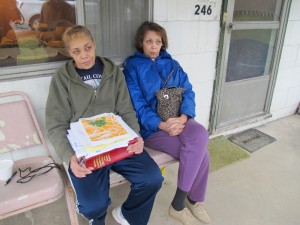Report cites lack of data on fracking health issues

Susan Phillips / StateImpactPA
Jeannie Moten (L) on the porch of her mother's house in Washington County. Moten says she developed skin lesions after gas drilling began nearby.
More than a decade into the U.S. fracking boom, researchers still don’t have enough information to determine whether the controversial method of extracting oil and gas threatens public health, a leading health-policy journal said on Monday.
Health Affairs, which analyzes public-health issues for readers including government officials, health-care advocates and scholars, said a lack of definitive data was in part the result of scarce government funding. It also blamed corporate reluctance to disclose details on chemicals used in fracking; the long-term nature of epidemiology needed for credible studies, and flaws in some studies.
It said there have been many studies that have associated fracking (hydraulic fracturing) with air and water contaminants, and which have noted many pathways by which fracking-related chemicals can enter the environment.
But it says information on individual exposures and baseline data on pre-fracking conditions are often hard or impossible to find.
“These and other data gaps have hindered the kind of large-scale epidemiological studies that can link exposures to actual health outcomes, with valid comparison groups,” said the report by David Tuller, the academic coordinator of the joint masters program in journalism and public health at the University of California at Berkeley.

Susan Phillips / StateImpact Pennsylvania
Dr. Amy Pare says she has treated workers and residents in southwestern Pennsylvania who think gas drilling has made them sick.
It comes a few days after the U.S. Environmental Protection Agency issued a long-awaited investigation into links between fracking and drinking-water quality, concluding that there was no widespread evidence that the industry had impacted water supplies, despite some “specific instances” where water sources, including private wells, had been affected.
The EPA’s report, which followed years of claims by critics that public health is threatened by toxic chemicals used in fracking, did not specifically address health effects.
The Health Affairs report, which was written before the publication of the EPA’s study, said much of the information on fracking’s health effects continues to be anecdotal rather than empirical, and that hinders policy making.
“We know something is happening where fracking is going on, we’ve heard this information from too many places,” said Madelon Finkel, a professor of health care policy at Weill Cornell Medical College, in the article. “But to what extent, to what degree – that’s what we need to empirically document.”
State and federal agencies have been “negligent” in monitoring the effect of fracking on communities, and so have contributed to the shortage of data, said Richard Jackson, a professor of environmental health at the University of California, Los Angeles, in the paper.
It said state health officials have often played a “secondary role” in policy development, and that the boom in well construction in states such as Pennsylvania has exceeded researchers’ ability to monitor any link to slow-moving illnesses such as cancer and the effect of endocrine-disrupting chemicals.
But Finkel of Weill Cornell predicted that links between long-term illness and fracking may become clearer as the industry matures.
“Fracking has been going on insufficient locations for a sufficient period of time that we should be able to start seeing certain morbidity and mortality figures,” she is quoted as saying.
The data shortage prevents policy makers from drawing balanced conclusions about the industry’s effects, the article said. It cites a study from the Colorado School of Public Health which said in January 2014 that babies born near natural gas drilling were 30 percent more likely to have congenital heart defects than those born in other areas.
Although the Colorado study included 125,000 births in the state over 13 years, it did not take into account other factors that could have affected births, including maternal health and prenatal care, the article said.
But Dr. David Brown, a public health toxicologist who works with Southwest Pennsylvania residents who believe their health has been hurt by local gas development, rejected the view that more studies are needed to determine the safety of fracking, saying there is already clear evidence that people living near shale gas wells are being exposed to toxic substances that damage their health.
The Colorado study cited by Health Affairs shows that there are in fact negative health outcomes, in the form of heart defects, among babies born near gas wells, Dr. Brown said. He dismissed the report’s conclusions that other factors such as maternal health might have contributed to the childrens’ heart defects, saying that the proximity of gas wells set the sample apart from other locations around the country.
Dr. Brown, a consultant to the Southwest Pennsylvania Environmental Health Project, said that waiting for epidemiology to be completed will continue to expose people in intensively drilled areas like Washington County, PA to toxics that threaten their health.
“How much data do they want?” he asked. “Historically, health departments have not waited until they have complete, peer-reviewed public information before taking action. It’s only with this topic that we seem to have come into this idea that you need peer-reviewed publications in order to stop exposures.”
Dr. Brown, whose organization provides medical referrals and preventive advice to patients suffering from complaints such as skin rashes, headaches and stomach complaints, said government previously delayed action against other threats to public health and should avoid doing so again in the case of gas drilling.
“We’ve gone down that path before with lead and with smoking and there is no reason to believe we should go down that path again,” he said.
Dr. Tuller said in an interview that the question of whether to wait for further studies before creating policy was a political one, and that policymakers were unlikely to adopt a “precautionary principle.” The notable exception is New York State, which has banned fracking because of concerns about its health effects, he said.
“There’s a lot of evidence of specific instances of contamination and there’s very little epidemiologic work so far that would indicate that kind of data that industry and many people in government would like to take action,” he said. “We haven’t invested in the kinds of studies that you need.”
















